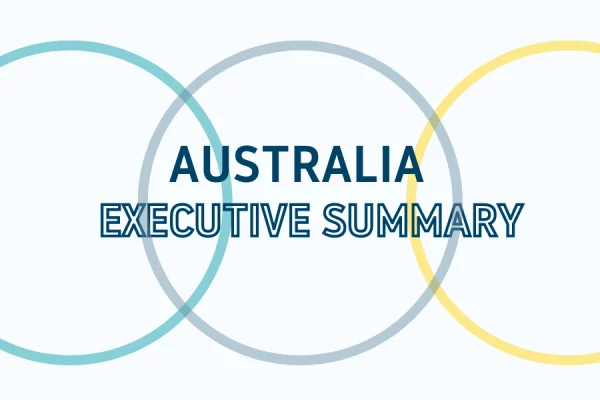Australia
For Australia’s journey toward pluralism, it must reconcile with its colonial past to ensure more equal and inclusive opportunities for all.
02.06.2023
Assessed Groups
- Indigenous Australians
- CALD Migrants
- Temporary Migrants
Australia is a country with many different cultures. Half of the country’s population is either born overseas or has one parent born overseas. However, Australia has a complicated relationship with diversity. This comes from its history of colonialism and ethnically restrictive immigration policies. By highlighting the experiences of Indigenous Australians, Culturally and Linguistically Diverse (CALD) migrants and Temporary Migrants, the Global Pluralism Monitor: Australia report points to the variety of views about diversity held by Australians. Overall, Australia has a mixed approach to diversity. Although the government has made advances in making Australia more accepting of different cultures by celebrating and recognizing diversity, in practice, systemic inequalities persist. This assessment was completed in 2021.
Takeaways
Structural inequalities undermine progress toward pluralism
In general, opportunities for access and participation across Australian society are equitable for all communities. While Australia is making strides to continue offering accessible services, historical structural inequalities still find ways to impact the political, economic and social spheres of society.
Aboriginal and Torres Strait Islander people face economic inequalities due to historic laws, structural racism and unsafe working environments. Women also earn less on average than men and are often underrepresented in politics and the private sector. Moreover, while Australia has accessible education and healthcare systems, certain communities such as the Aboriginal and Torres Strait Islander peoples and asylum seekers face challenges in accessing these services. The COVID-19 pandemic exacerbated health inequalities among these groups, demonstrating a need for continued adoption and implementation of policies that address equal access in these sectors.
Reconciling with positive support for multiculturalism but low societal ownership
Australia values and supports multiculturalism, with 86 percent of the population agreeing it benefits society. A people’s sense of belonging indicates the extent to which a society is pluralistic.
Most Australians feel comfortable expressing their identities in public without fear. However, Australia might have hit its limit in terms of accepting diversity. Many Australians wish for diversity in society to dissipate. Moreover, Indigenous Australians have not yet received the recognition and accommodation needed to feel a sense of shared ownership in society, which hinders Australia’s advancement towards pluralism. For many minority communities, a sense of shared ownership in Australian society seems unreachable, despite the country’s generally positive attitude towards diversity and pluralism.
Moving forward from past injustices
Australia has a legal framework that grants equal civil and cultural rights to all citizens. However, minority groups often exhibit a lack of confidence in these systems, particularly Indigenous Australians.
Indigenous Australians continue to face significant challenges with respect to their basic human rights and freedoms, despite the country’s anti-discrimination laws. This systemic discrimination is ingrained in Australia’s legal system with Indigenous Australians still facing unequal treatment in criminal, child protection and welfare systems. While the 2008 national apology to Indigenous people and the Stolen Generations was a major step toward addressing past injustices, gaps between commitment and implementation exist.
Drivers for Pluralism in Australia
These best practices are driving and enhancing pluralism in Australia.
Diverse Political Representation
There is a strong representation of Indigenous Australians in the Senate and in Parliament. Australia has achieved gender parity in the Senate.
Acceptance of Diversity
Most Australians believe multiculturalism has been good for Australia.
Support to Indigenous Peoples
New government initiatives aim to improve health outcomes for Indigenous peoples. The resurgence of cultural knowledge and practices are gaining momentum in Australian societies.
Recommendations
Legal Commitments
To further bolster the recognition of diversity and human rights, Australia has the opportunity to legally implement the UN Declaration on the Rights of Indigenous Peoples, restructure its legal system to reduce Indigenous youth incarceration and combat inequalities, address concerns raised by UN member states about detaining refugee children, raise the minimum age of criminal responsibility to 14 years and push for stronger gender rights and protections.
Leadership for Pluralism
Further constitutional and political reforms may help promote equitable participation in the economic, social and cultural domains for Indigenous peoples and diverse communities in Australia. This could involve the federal government addressing political inequalities that contribute to a lack of representation and participation of diverse communities.
Group-Based Inequalities and Belonging
Addressing systemic inequalities offers an opportunity to promote pluralism in Australia. The federal government can provide further funding to civil society organizations, particularly multicultural organizations, to respond to an increase in hate crimes and to build active and safe communities that protect all of its members.

Indicators
Legal Commitments
International Commitments
Average score: 6
Australia has signed and ratified several international human rights protocols. However, it has declined to sign or ratify other important protocols, such as the International Convention on the Protection of the Rights of All Migrant Workers and Members of their Families.
National Commitments
Average score: 6
Australia has anti-discrimination laws that prohibit discrimination based on various factors, including race, gender, age, disability, sexual orientation and gender identity. Regardless, Indigenous Australians still face discrimination and inequalities in areas such as education, health, housing, jobs, land and the environment. There is no bill of rights or equal protection clause in the Australian Constitution to safeguard these rights.
Inclusive Citizenship
Average score: 7
With changes to its visas, Australia has made citizenship more difficult to obtain. Permanent residents must reside in the country for four years and have good moral character. Refugees and humanitarian migrants have the highest uptake of Australian citizenship at 78 percent. This is followed by 67 percent of skilled workers receiving citizenship and only 53 percent of family visa holders. Others have raised concerns about the citizenship test’s restrictiveness and the English language requirements. Dual citizens cannot stand for election or sit as MPs.
Practices
Policy Implementation
Average score: 6
The Australian government has implemented policies to support pluralism, but there are lags in policy implementation for Indigenous communities. The government has been slow at times to act on diversity, sexual discrimination and harassment policies, and parliamentary inquiries have not been adequately responded to. Delays in citizenship processing have also occurred.
Data Collection
Average score: 6
The Australian Bureau of Statistics (ABS) collects and analyzes data on various issues but official statistics on inequalities faced by culturally diverse segments of the population are hard to obtain. The ABS collects data on variables such as place of birth and language spoken at home, but gaps remain in measuring cultural diversity.
Claims-making and Contestation
Average score: 5
Australia has a strong democratic culture with legal institutions facilitating claims-making. However, this democratic culture is not translating positively, with many Australians being ambivalent about democracy and only 38 percent believing it works well. Moreover, temporary migrants face visa-related issues and civil society organizations have shrunk. Particularly, advocacy and lobby groups for people of colour and for those experiencing discrimination have limited resources.
Leadership for Pluralism
Political Parties
Average score: 5
Australia has three prominent political parties: the Liberal, Labor and Greens. The Labor party is the most supportive of social and cultural pluralism. Additionally, while all parties address Indigenous concerns, the Greens demonstrate an attempt to keep justice for the Stolen Generations in sight. At the time of report production, the Liberal Party was in power and has since shifted to the Australian Labor Party.
News Media: Representation
Average score: 4
Diversity in Australia’s media could be improved across language, gender, ethnicity and age. Public broadcasters SBS and ABC have increased minority ethnic representation, but commercial media outlets have room to improve in portraying diversity. This lack of diversity can reinforce negative stereotypes, which policy-makers and media organizations could address.
News Media: Prominence of Pluralistic Actors
Average score: 5
Some Australian news media organizations defend diversity at the local and community levels. At the individual level, a dozen prominent media actors routinely promote and defend Australia as an inclusive and pluralistic society. Still, Australia has many diversity critics whose voices are prominent across the media.
Civil Society
Average score: 7
Australia is home to over 300,000 non-governmental and non-profit organizations. There are also organizations that promote the interests of Aboriginal and Torres Strait Islander peoples and represent migrants and refugees. Civil society actors provide important linkages between stakeholder communities and government. Additionally, university-based research centres and advocacy institutes contribute to public discourse and policy-making in areas such as citizenship, migration and social inclusion.
Private Sector
Average score: 7
Australia’s workforce is diverse but gender and ethnic representation in leadership is inequitable. For example, women represent only 21% of executive teams and 30% of boards of directors while ethnic minorities face bias in selection and promotion. To work towards greater equity in the private sector, many large companies have policies to increase diversity, which Australians support overwhelmingly.
Group-based Inequalities
Political
Average score: 4
The political representation of permanent and temporary migrants, women and cultural minorities is limited in Australia. Left-leaning political parties are typically more inclusive towards migrants. Greater representation of Aboriginal and Torres Strait Islander peoples and minority communities is still needed. Debates also revolve around the minimum voting age and prisoner disenfranchisement, as well as the status of compulsory voting laws.
Economic
Average score: 5
Australia’s economic inequalities range across race, gender and nationality. Aboriginal and Torres Strait Islander peoples have historically been denied equitable access to the economy. They have also been dispossessed of their land and property which contributes to their economic inequality. Women also face a gender pay gap and are underrepresented in full-time employment and leadership roles. Non-English speaking migrants have lower incomes and face barriers to employment opportunities.
Social
Average score: 5
Australia has a state education system, universal healthcare and social welfare programs, but Aboriginal and Torres Strait Islander communities, refugees and people with disabilities, among others, face barriers to accessing education and healthcare. Aboriginal and Torres Strait Islander peoples have poor health outcomes. A promising Multicultural Servicing Strategy aims to deliver support to this diverse population.
Cultural
Average score: 6
Historical laws of assimilation and segregation suppressed and eliminated Indigenous cultural practices in Australia. However, lifting these laws in the 1970s led to a cultural renaissance and improved the health and well-being of Aboriginal and Torres Strait Islander people. Still, cultural inequalities and negative attitudes towards diversity and minority groups persist, as do concerns around gender inequality, particularly for women with disabilities and Indigenous women.
Access to Justice
Average score: 6
The Australian justice system succumbs to highly bureaucratic obstacles and systemic biases toward minority groups, particularly Aboriginal and Torres Strait Islander peoples. Political influence in judicial appointments is a concern, and there is no bill of rights. Despite landmark cases recognizing Aboriginal and Torres Strait Islander title, the justice system exhibits bias, leading to over-representation of marginalized peoples in prison and continuing bias against women.
Intergroup Relations and Belonging
Intergroup Violence
Average score: 7
Australia’s history and ongoing relationship with racial violence includes conflicts with Indigenous peoples, Chinese miners and Indian students, with ongoing sporadic incidents targeting other marginalized groups. The media’s sensationalism of ethnic youth gangs is criticized. Moreover, the rise of white nationalist groups and neo-Nazism is a concerning development, exemplified by amass shooting at a mosque in Christchurch, New Zealand by an Australian white nationalist in 2019.
Intergroup Trust
Average score: 6
A study found that visible minority groups are less likely to interact with people from different racial or ethnic groups in public spaces in Australia, while majority groups tend to segregate themselves. However, the Global Centre for Pluralism’s Pluralism Perception Survey suggests a high level of intergroup trust among Australians from diverse backgrounds, with more than 75 percent of respondents saying they would be comfortable with a supervisor from a different gender, race, ethnicity or religion. The survey identified a positive correlation between trust in different groups and female-identifying respondents.
Trust in Institutions
Average score: 6
The Centre’s Pluralism Perception Survey found that Australians have stronger interpersonal and intergroup relations compared to their relations with political parties and state institutions. The survey showed low levels of trust in trade unions (9 percent), federal parliament (9 percent) and political parties (3 percent). An individual’s level of trust also varied depending on education, age and finances, with financial income correlated with greater trust in democracy.
Inclusion and Acceptance
Average score: 7
The majority of Australians are accepting of diversity and multiculturalism, with surveys showing high levels of public acceptance. Many minority groups feel at home in Australia, particularly in larger cities. However, Australians’ support for diversity and multiculturalism is conditional, with a desire for minorities to adopt Australian customs instead of maintaining their own customs. Rural and regional Australians, people with lower education levels and supporters of certain political parties tend to be less supportive of increased diversity and immigration.
Shared Ownership of Society
Average score: 5
Australia is a highly stable and cohesive society, with indicators such as the UN Human Development Index and OECD Better Life Index ranking it among the top countries for quality of life. Despite this, recognition of and accommodation for Indigenous Australians are lacking, and many minority communities do not feel a sense of shared ownership in Australian society.


